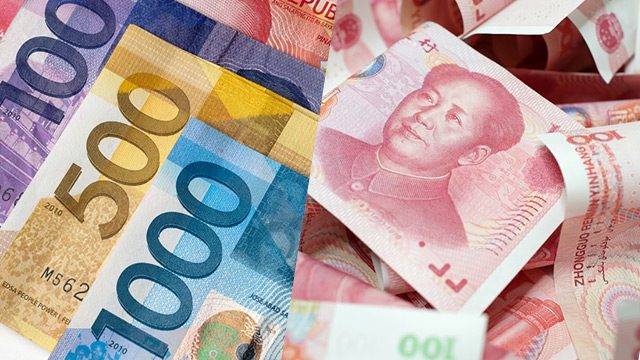SUMMARY
This is AI generated summarization, which may have errors. For context, always refer to the full article.

MANILA, Philippines – The weakening of the Philippine peso on Tuesday, August 11 was a knee-jerk reaction to the decision of China’s central bank to devalue its tightly controlled currency, the Bangko Sentral ng Pilipinas (BSP) said.
Currencies in the region, including the Philippine peso, weakened after Chinese authorities devalued the yuan, BSP Governor Amando Tetangco Jr said in a text message Tuesday.
“As expected, initial market reaction on the announcement of the yuan devaluation was weakness among the regional currencies, including the peso,” Tetangco said.
The peso Tuesday slumped to a new 5-year low of P45.93 to $1 from Monday’s P45.76 to $1, after the People’s Bank of China announced the daily fixing rate of the yuan against the US dollar. Under the devaluation, the Chinese currency is allowed to trade 2% above or below the daily reference rate.
Volume almost doubled to P1.1 billion from Monday’s P541.8 million.
Temporary setback
The BSP chief believes the weakening of the peso against the greenback is temporary.
“Should the adjustment in the yuan, however, become effective in supporting Chinese exports in the near-term, that could help sustain regional trade and in turn help support global growth,” Tetangco said.
The movement of the peso would be affected by external developments such as the yuan devaluation, the Greek debt crisis, and the impending US Federal Reserve liftoff.
Tetangco is also is confident that market participants would take into consideration the strong macroeconomic fundamentals of the Philippines.
“The peso will continue to be affected by external developments, such as this, but market participants are also expected to put weight on the country’s sound macrofundamentals,” he added.
Economic managers see the country’s gross domestic product (GDP) expanding between 7% and 8% this year, despite slowing down to 5.2% in the first quarter on the lack of government spending.
Inflation averaged 1.9% in the first 7 months of 2015, after easing to a new record low of 0.8% in July on the back of stable food prices.
BSP has set an inflation target of 2% to 4% this 2015. – Rappler.com
Philippine peso and China yuan images from Shutterstock
Add a comment
How does this make you feel?
There are no comments yet. Add your comment to start the conversation.